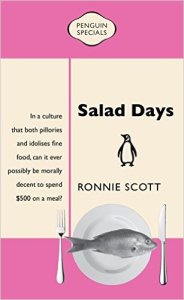Book Review: “Salad Days” by Ronnie Scott
by Jan
 It appears that Scott has dined with a restaurant reviewer, and he seems to be exploring some thoughts about cuisine, restaurants, and trying to justify his keen interest in fine dining.
It appears that Scott has dined with a restaurant reviewer, and he seems to be exploring some thoughts about cuisine, restaurants, and trying to justify his keen interest in fine dining.
He says that a restaurant’s job is to dress up ingredients for sale. It’s done in an attractive setting at sometimes unattractive prices. Unlike a painting or a sculpture it’s gone in 5 minutes. The smarter the restaurant, the more it costs.
If one has dined at say, Noma, el Bulli or Fat Duck, it’s saying “I’ve been there”. Numerous people could be justified in thinking this is morally indefensible, when a large percentage of the bill could have been donated to a charity instead. The more conspicuous the consumption of it appears to be, the more the ethics are questioned, compared with say slurping a bowl of noodles in a food court.
People construct their identity and culture through consumption choices and rituals including those associated with food. Leisure consumption is where differentiation, assimilation and style of commodities are most visible, ie. an opportunity to express one’s identity in the public sphere.
You can see this when people post a photo of their latest meal on their blog or Facebook, and the review is limited to: OMG it’s awesome!!!!!!!!!
If some Gen Y consumers don’t cook a lot they presumably obtain cooked food via retail. And possibly eat it in front of a cooking show on TV. This means that their relationship with food and identity are somewhat distorted.
“Salad Days” is the right name for this essay. Scott has yet to explore more deeply some food issues beyond fine dining restaurants. For example, the influence of immigrants in Australia, or whether Australia has a cuisine. Or the assertion that food in Australia is largely seen as fuel. Or the price pressures Australian farmers have to withstand from the large supermarkets, which could result in the lack of viability of sustainably produced food. Or the effect of farmers going out of business because their land is being fracked. These issues are worth exploring much more than if someone blows $500 on a feed.
But as Thea Brooke says in her blog: the essay is an amuse-bouche for a plane ride.